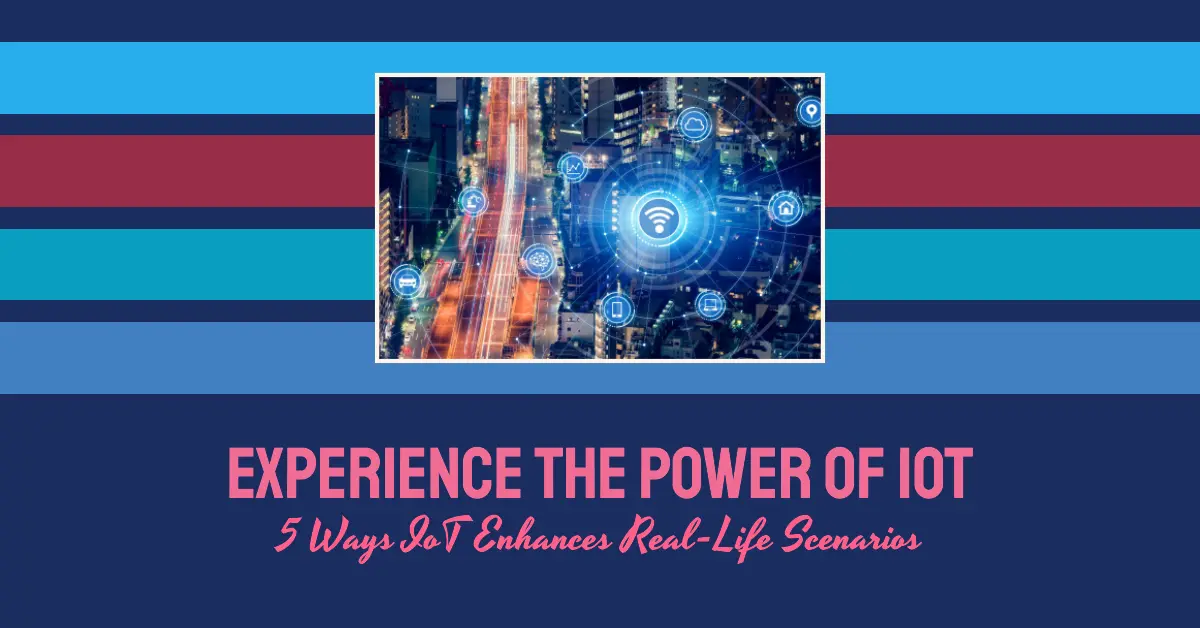
5 Ways the Benefits of IoT Enhance Real-Life Scenarios
In our rapidly advancing digital age, the Internet of Things (IoT) has emerged as a groundbreaking technology, connecting devices and enabling them to communicate seamlessly. This interconnected network of everyday objects, embedded with sensors and software, has transcended the realm of mere convenience. The benefits of IoT in real-life scenarios are profound and far-reaching, revolutionizing the way we live, work, and interact with the world around us. Let’s explore five compelling ways IoT enhances our daily lives.
1. Smart Homes for Intelligent Living
Imagine a home that knows your preferences, adapts to your routine, and ensures energy efficiency — this is the promise of IoT in our homes. Thermostats adjust themselves based on weather conditions; lights dim or brighten as per your mood or the time of day. IoT-enabled security systems provide real-time updates, allowing homeowners to monitor their property remotely. From smart fridges that suggest recipes based on available ingredients to intelligent coffee makers brewing your favorite cup as you wake up, IoT transforms residences into intelligent, responsive environments, enhancing both comfort and security.
Popular brands that offer IoT devices for smart homes
- Smart thermostats: Nest, Ecobee, Honeywell Lyric
- Smart lights: Philips Hue, Lifx, Wyze
- Smart security systems: Ring, SimpliSafe, Arlo
- Smart appliances: LG ThinQ, Samsung SmartThings, GE Profile
- Smart speakers: Amazon Echo, Google Home, Apple HomePod
2. Healthcare Redefined
In the realm of healthcare, IoT innovations have paved the way for more personalized and efficient patient care. Wearable devices equipped with IoT technology can monitor vital signs, track physical activity, and even alert medical professionals in case of emergencies. Patients with chronic illnesses can benefit immensely; IoT devices remind them to take medications, monitor their condition, and transmit this data to healthcare providers in real-time. This connectivity not only improves patient outcomes but also reduces the burden on healthcare facilities, making medical services more accessible and affordable.
Popular brands that offer IoT devices in Healthcare
- Wearable devices: Fitbit, Garmin, Apple Watch
- Remote patient monitoring (RPM) devices: Medtronic CareLink, Dexcom G6, AliveCor KardiaBand
- Intelligent medical devices: GE Healthcare Edison Platform, Philips IntelliSpace, Siemens Healthineers Mindray MUSE
3. Smart Cities for Sustainable Living
IoT plays a pivotal role in transforming urban spaces into smart cities. Smart traffic management systems use real-time data to optimize traffic flow, reducing congestion and pollution. Waste management becomes efficient, as sensors alert authorities when bins are full, optimizing collection routes. Public services are enhanced through smart lighting, parking, and water management systems, making urban living more sustainable and environmentally friendly. IoT contributes significantly to creating cities that are not only technologically advanced but also ecologically conscious.
Popular brands of IoT devices that are used in smart cities
- Smart traffic management: Cisco, IBM, Siemens
- Waste management: Envirolutions, Smartbin, Waste Intelligence
- Smart lighting: Philips Lighting, Signify, Acuity Brands
- Smart parking: Parkeon, Indigo, Amano McGREGOR
- Smart water management: Sensus, Itron, Elster
4. Enhancing Industrial Processes
Industries are leveraging the benefits of IoT to optimize production, enhance safety, and reduce costs. IoT-enabled sensors in manufacturing equipment monitor performance, predicting maintenance needs and preventing costly downtimes. Supply chain management benefits from real-time tracking, ensuring the timely delivery of goods. In agriculture, IoT devices collect data on soil moisture, weather patterns, and crop health, enabling farmers to make informed decisions, maximize yields, and conserve resources. By enhancing industrial processes, IoT drives efficiency, boosts productivity, and ultimately contributes to economic growth.
Popular brands of IoT devices that can be used in industries
- Manufacturing: ABB, Bosch, Honeywell, Siemens, Schneider Electric
- Supply chain management: Zebra Technologies, Descartes Systems Group, Trimble, Oracle
- Agriculture: AgLeader, CropMetrics, Raven Industries, Deere & Company
5. Revolutionizing Education
IoT is revolutionizing the education sector, creating immersive and interactive learning experiences. Smart classrooms are equipped with top IoT devices that facilitate personalized learning. Interactive whiteboards, tablets, and educational apps engage students, making the learning process dynamic and enjoyable. IoT-enabled systems track student attendance, monitor classroom temperatures, and ensure the safety of school premises. Beyond traditional classrooms, IoT facilitates remote learning, connecting students and educators globally. This accessibility to education enriches learning opportunities, making knowledge more accessible to diverse communities.
Popular brands of IoT devices that are used in smart classrooms
- Interactive whiteboards: Promethean, SMART Technologies, Mimio
- Tablets: Apple, Samsung, Google
- Educational apps: Khan Academy, Prodigy, Duolingo
- IoT-enabled systems: Cisco, Intel, Microsoft
- Remote learning platforms: Zoom, Google Meet, Microsoft Teams
In conclusion, the transformative impacts of IoT in real-life scenarios underscore the significant benefits of IoT in business. It revolutionizes various aspects of our lives, from the convenience of our homes to the efficiency of our industries. IoT technology enriches our experiences, making them smarter, safer, and more sustainable, thereby enhancing the business landscape. Embracing the potential of IoT not only drives us toward a future of innovation but also nurtures a connected world where opportunities are boundless. As IoT continues to evolve, it is certain to redefine the way we perceive and interact with the world, creating a future where technology serves humanity in profound and meaningful ways, particularly in the realm of business.